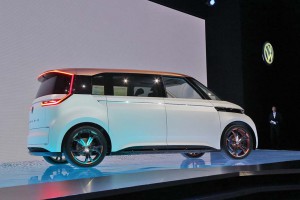
As companies like VW focus more resources on EVs, it will cost some folks their jobs working on combustion-powered vehicles.
Many automakers have been pushing to make big strides in their electric vehicle programs and no automaker has been more successful to this point with EVs than Tesla.
There are plenty of upsides to electric vehicles, but they have their sticking points: limited range and, in some cases, charging times that make them impractical for day-to-day use. However, there is another side to EVs that can also be detrimental that is coming to light.
As many automakers are bolstering the EV operations, especially Volkswagen AG, which points out it expects to have 30 new EVs out in the marketplace be 2025, some believe the move will transform the industry. That transformation make come with a cost.
German automotive supplier Continental AG’s Chief Executive Elmar Degenhart told a newspaper, the shift to EVs will cost jobs at the supplier. However, he added that many of those losses would be offset by new positions related to electro-mobility.
“Due to the low added value, production jobs will be lost,” Degenhart told German weekly paper Welt am Sonntag.
(VW set to debut battery Microbus at NAIAS. For more, Click Here.)
However, his prediction stopped short of pinpointing when and how many jobs would be coming with the rise of electric vehicles.
“There is enough time to design the process such that the blow is softened and major pain can be avoided,” he said.
According to Degenhart, about 30,000 of 218,000 jobs at Continental are dependent on combustion engines, the paper said.
Continental said last month it would increase spending on electric-car components in coming years but expects to avert any major impact on its earnings through additional sales from new R&D projects.
(VW Identifies a new direction with I.D. battery car. Click Here to check it out.)
Combined sales of hybrids, plug-ins and pure battery-electric vehicles have accounted for barely 3% of U.S. new vehicle sales. But experts believe that will start to rise sharply due to a variety of factors, including the December decision by the Environmental Protection Agency to stick with planned rules calling for new vehicles to deliver an average 54.5 mpg in 2025.
Additionally, the launch of the Chevrolet Bolt EV, the first long-range electric vehicle priced for the mainstream – under $30,000 after federal tax credits and considered a success.
Dozens of automakers, from mainstream marques Ford, Toyota and Volkswagen to upscale brands BMW, Mercedes-Benz and even Aston Martin, announced their own long-range EV plans this past year. Consulting firm IHS Automotive predicted sales of pure EVs could top 3 million by 2025, and some industry planners believe the figure could run twice as high.
Volkswagen is essentially doubling down on EVs in the wake of its diesel emission scandal, vowing to roll out 30 new models by 2025. The maker’s latest attempt to show its seriousness is the introduction of the new Microbus EV concept at the North American International Auto Show.
(To see more about three California drivers taking delivery of first three Bolts in the U.S., Click Here.)
The concept is an alternate take on the Golf-sized battery-electric I.D. hatchback that made its debut at the Paris Motor Show in September. And it could provide a hint of what’s to come as VW prepares to launch more than two dozen new battery-cars during the next decade.

When you look at the whole EV package, it will require a new generation of mechanics. Less maintenance with more specialized digital tools. It maybe similar to when aircraft piston engines where replace by jet engines. Similar work with more specialized training and skills.